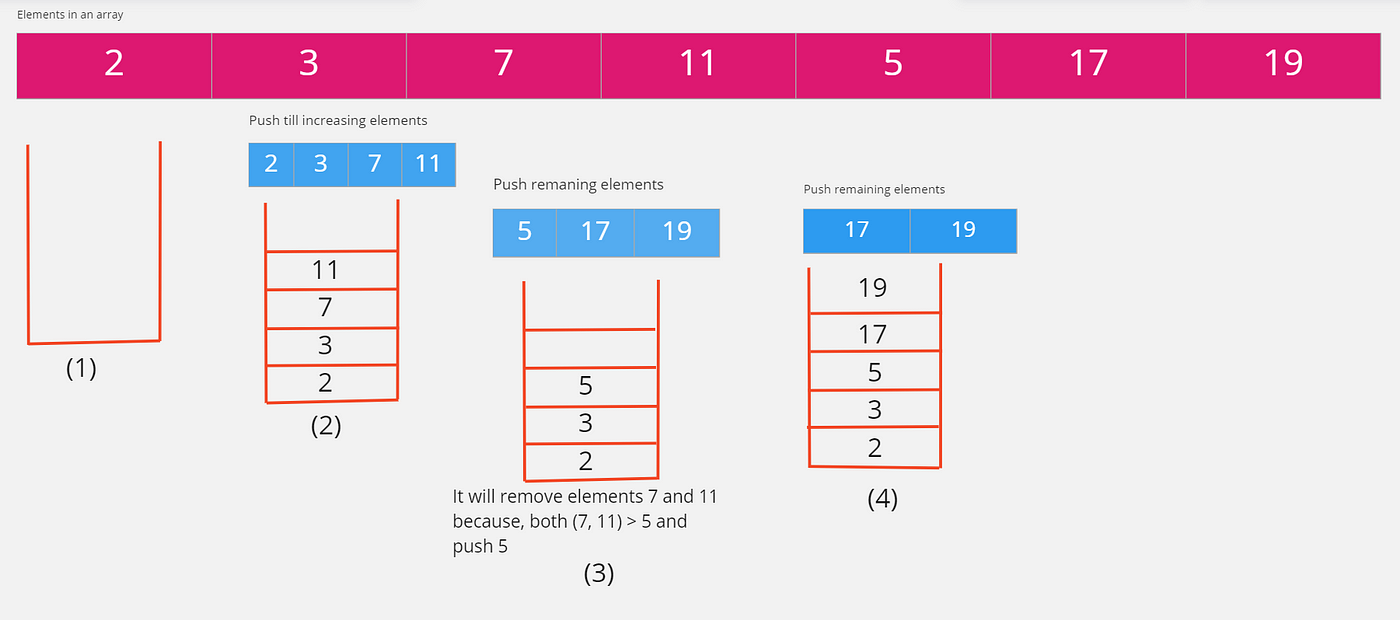Monotonic Stack
Monotonic Sequence
- aka: monotonic stack or monotonic queue(deque)
- The word "monotonic" means a list or a function is either always increasing, or always decreasing.
- We can implement monotonic sequence using either stack or queue, but the later gives us more flexibility as it allows removal from front.
- Monotonic stack is like a regular stack with one key distinction in the push operation:
- Before we push a new element onto the stack, we first check if adding it breaks the monotonic condition.
- If it does, then we pop the top element off the stack until pushing the new element no longer breaks the monotonic condition.

Monotonic Sequence Code Template
- To find the next smaller element
# using stack
def mono_stack(nums):
n = len(nums)
stack = [] # stores *indices*
result = [-1] * n
for index in range(n):
while stack and nums[index] < nums[stack[-1]]: #nums[idx] > ... for next greater elt
result[stack[-1]] = elt
stack.pop()
stack.append(index)
return result
#or using queue
def mono_deque(nums):
n = len(nums)
deq = deque()
result = [-1] * n
for index in range(n):
while deq and nums[index] < nums[deq[-1]]:
result[deq[-1]] = nums[index]
deq.pop()
deq.append(index)
return result
Application of Monotonic Stack
- We can use this technique to find the next smaller or greater
eltby iterating from start-end- Or we can use it to find the previous smaller or greater
eltby iterating from end - front
- Or we can use it to find the previous smaller or greater
- Next Largest or Smallest Element in a List
- Maximum or Minimum Element in a Sliding Window
Sliding Window Maximum
- Sliding Window Maximum
- Find the maximum integer within the window each time it moves.
Input: nums = [1,3,-1,-3,5,3,6,7], k = 3
Output: [3,3,5,5,6,7]
Explanation:
Window position Max
--------------- -----
[1 3 -1] -3 5 3 6 7 3
1 [3 -1 -3] 5 3 6 7 3
1 3 [-1 -3 5] 3 6 7 5
1 3 -1 [-3 5 3] 6 7 5
1 3 -1 -3 [5 3 6] 7 6
1 3 -1 -3 5 [3 6 7] 7
def sliding_window_maximum(nums: List[int], k: int) -> List[int]:
q = deque() # stores *indices*
res = []
for i, cur in enumerate(nums):
while q and nums[q[-1]] <= cur:
q.pop() #pop from right/end
q.append(i)
# if q[0] is out of bound(window size)-> remove it
if q[0] == i - k:
q.popleft()
# if window size == k, (k-1) since we're starting from 0(i=0)
if i >= k - 1:
res.append(nums[q[0]])
return res